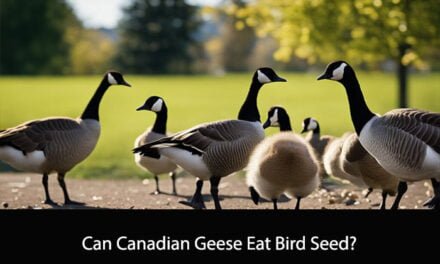Ferrets are curious creatures that can be quite picky eaters. As a result, ferret owners are always on the lookout for new foods that their pets can enjoy. One question that often arises is whether ferrets can eat canned cat food. The answer is not straightforward, as it depends on the specific brand and type of cat food.
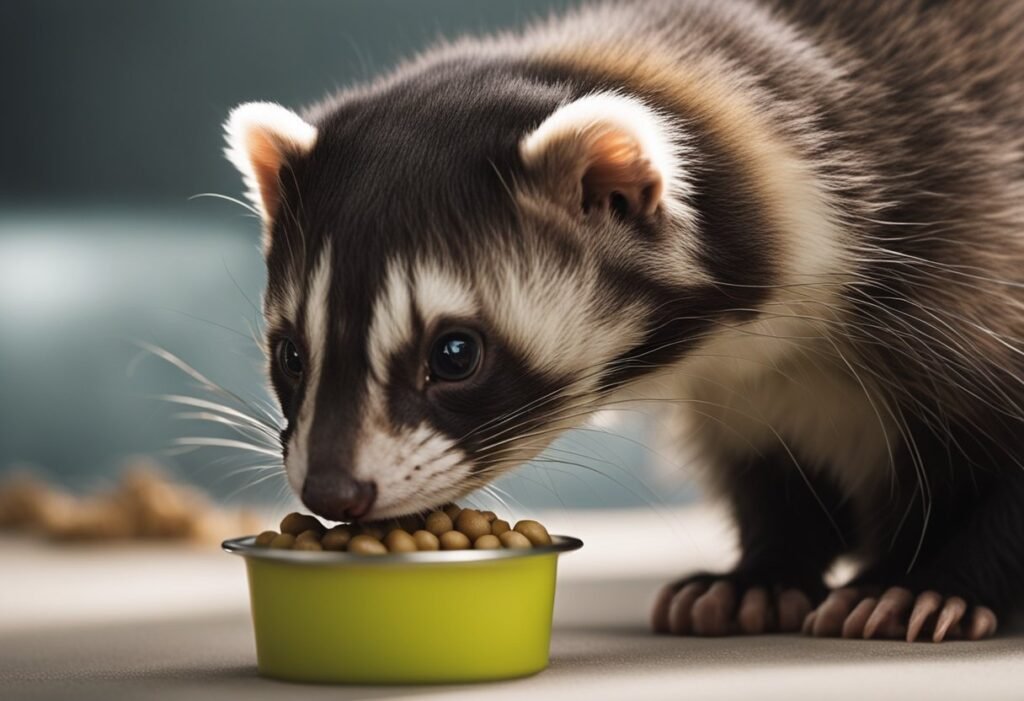
Canned cat food can be a good source of protein and other nutrients for ferrets. However, not all cat food is created equal, and some brands may contain ingredients that are harmful to ferrets. It is important to read the labels carefully and avoid any cat food that contains grains, vegetables, or fruits, as these are not suitable for a ferret’s digestive system. Additionally, cat food that is high in fat or sugar should also be avoided, as these can lead to health problems such as obesity and diabetes.
Can Ferrets Eat Canned Cat Food?
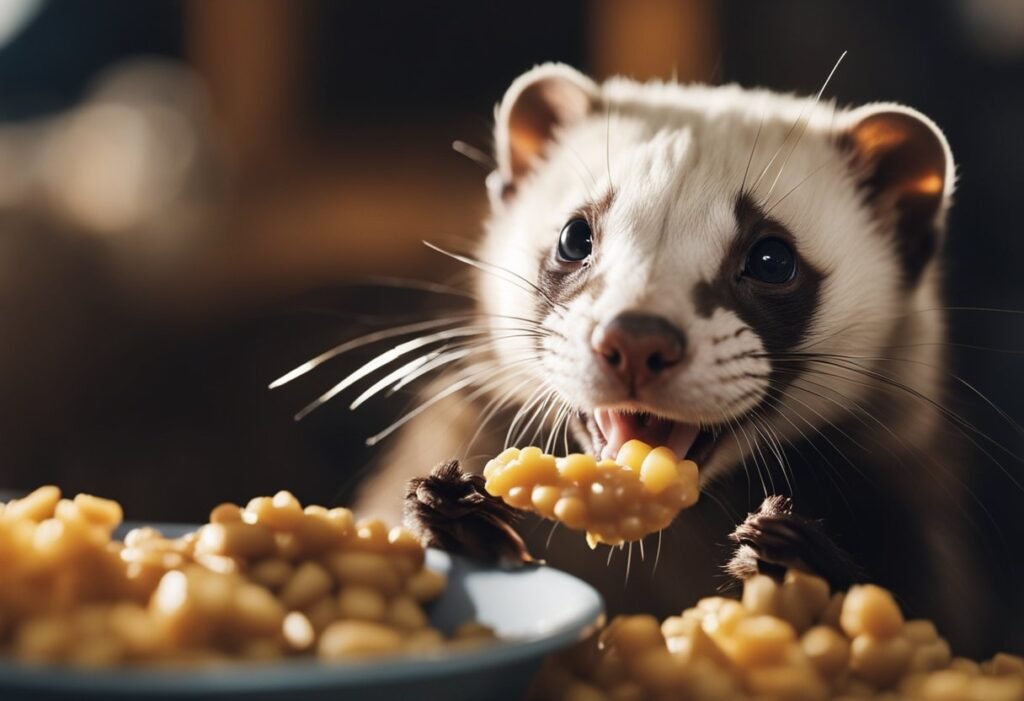
Ferrets are obligate carnivores, which means that their diet should consist of animal-based protein. Canned cat food is a popular choice among ferret owners as it is high in protein and moisture, which is essential for a ferret’s health. However, it is important to note that not all canned cat food is suitable for ferrets.
When choosing canned cat food for your ferret, it is important to look for a high-quality brand that contains at least 32% protein and less than 3% fiber. Additionally, the food should not contain any grains or vegetables as ferrets are unable to digest them properly.
It is also important to note that canned cat food should not be the sole source of nutrition for your ferret. Ferrets require a balanced diet that includes a variety of protein sources such as raw meat, eggs, and high-quality kibble specifically formulated for ferrets.
In summary, canned cat food can be a good addition to a ferret’s diet as long as it is high in protein, low in fiber, and does not contain any grains or vegetables. However, it should not be the only source of nutrition for your ferret.
Ferret Dietary Basics
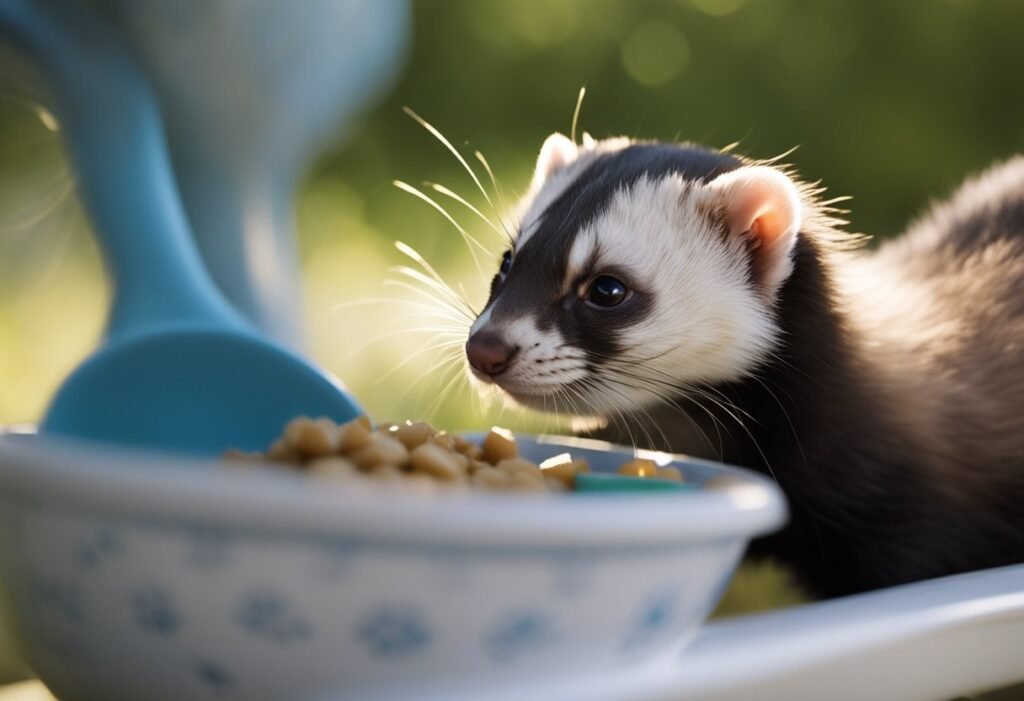
Ferrets are obligate carnivores, which means they require a diet that consists primarily of animal protein and fat. In the wild, ferrets primarily eat small prey such as rodents, birds, and insects. Ferrets have a high metabolic rate and require a diet that is high in protein and fat to maintain their energy levels.
Obligate Carnivores and Nutritional Needs
As obligate carnivores, ferrets have specific nutritional needs that must be met to maintain their health. Ferrets require a diet that is high in animal protein and fat and low in carbohydrates. A lack of protein and fat in a ferret’s diet can lead to a variety of health problems, including poor coat quality, muscle wasting, and even death.
Ferrets also require a source of taurine in their diet. Taurine is an amino acid that is essential for a variety of bodily functions, including maintaining heart health, vision, and immune function. Ferrets cannot produce taurine on their own and must obtain it through their diet.
Risks of Improper Diet
Feeding a ferret an improper diet can lead to a variety of health problems. Feeding a diet that is too high in carbohydrates can lead to obesity, insulinoma, and dental problems. Feeding a diet that is too low in protein and fat can lead to muscle wasting, poor coat quality, and even death.
It is important to feed a high-quality, balanced diet to ensure that your ferret receives all of the nutrients they need to maintain their health. While some ferret owners may consider feeding their ferrets canned cat food, it is important to choose a high-quality, grain-free cat food that is specifically formulated for ferrets to ensure that their nutritional needs are met.
Canned Cat Food Ingredients
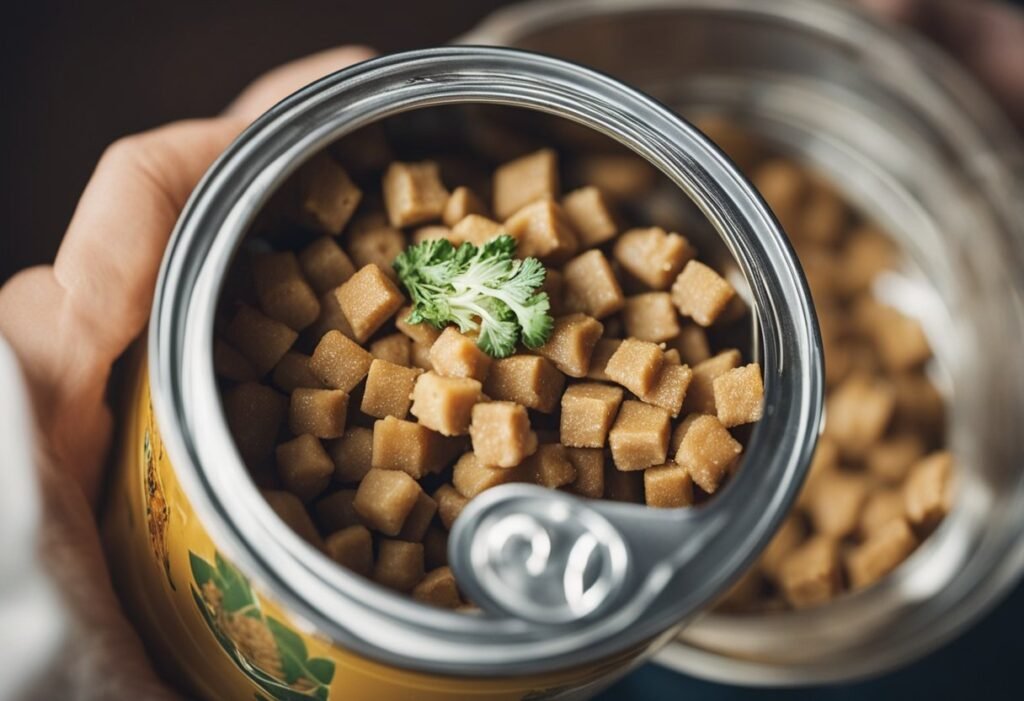
Canned cat food is a popular choice for pet owners looking for a convenient and nutritious meal for their feline friends. However, some ferret owners may wonder if canned cat food is an appropriate food choice for their pets. In this section, we will take a closer look at the ingredients in canned cat food and what they mean for ferrets.
Protein Content and Quality
Protein is an essential nutrient for both cats and ferrets. Canned cat food typically contains high-quality sources of protein, such as chicken, fish, and beef. These proteins are important for building and maintaining muscle mass, as well as supporting a healthy immune system.
However, it is important to note that cats and ferrets have different protein requirements. While cats are obligate carnivores and require a high amount of protein in their diet, ferrets are carnivores but do not require as much protein as cats. Therefore, it is important to feed canned cat food to ferrets in moderation and supplement their diet with other protein sources, such as raw meat or high-quality ferret food.
Additives and Preservatives
Many canned cat foods contain additives and preservatives to improve their taste, texture, and shelf life. Some common additives include artificial flavors, colors, and thickeners. While these additives are generally considered safe for cats, it is unclear whether they are safe for ferrets.
Preservatives are also added to canned cat food to prevent spoilage and extend its shelf life. Some common preservatives include BHA, BHT, and ethoxyquin. While these preservatives are generally considered safe for cats, they may have negative health effects on ferrets. Therefore, it is important to read the label carefully and avoid canned cat foods that contain these preservatives.
Moisture Content
Canned cat food typically contains a high amount of moisture, which is important for maintaining hydration and preventing urinary tract problems in cats. However, ferrets have different hydration requirements than cats and may not require as much moisture in their diet.
Therefore, it is important to feed canned cat food to ferrets in moderation and supplement their diet with other sources of hydration, such as fresh water or wet food specifically formulated for ferrets.
In summary, canned cat food can be a nutritious and convenient food choice for ferrets when fed in moderation and supplemented with other sources of protein and hydration. However, it is important to read the label carefully and avoid canned cat foods that contain preservatives that may be harmful to ferrets.
Comparing Ferret Food and Cat Food
Nutritional Profile Differences
Ferrets and cats have different nutritional requirements. Ferrets are obligate carnivores, which means that they require a diet that is high in animal protein and fat. Cats are also obligate carnivores, but they have different nutritional needs than ferrets.
Cats require a diet that is high in protein, but they also need certain nutrients that are not found in meat alone, such as taurine. Most commercial cat foods are formulated to meet these nutritional requirements.
On the other hand, most commercial ferret foods are also formulated to meet the nutritional needs of ferrets. Ferret food is usually higher in fat and protein than cat food, and it may also contain other nutrients that are important for ferrets, such as taurine and arginine.
Kibble Size and Texture
Another difference between ferret food and cat food is the size and texture of the kibble. Ferrets have smaller mouths than cats, so they require smaller kibble that is easier to chew and digest. Ferret food is usually smaller and softer than cat food.
Cat food, on the other hand, is usually larger and harder than ferret food. This is because cats need to chew their food more thoroughly in order to prevent dental problems.
In summary, while there are some similarities between ferret food and cat food, there are also some important differences. Ferrets require a diet that is high in animal protein and fat, while cats require a diet that is high in protein and also contains other nutrients such as taurine. Ferret food is usually smaller and softer than cat food, while cat food is usually larger and harder.
Health Implications of Canned Cat Food
Canned cat food is a popular choice for many pet owners, but is it safe for ferrets to consume? Here are some health implications to consider before feeding your ferret canned cat food.
Digestive Health Concerns
Cats and ferrets have different digestive systems, and what may be safe for cats may not be safe for ferrets. Canned cat food often contains grains and other ingredients that ferrets cannot digest properly, leading to digestive issues such as diarrhea, vomiting, and stomach pain. Additionally, the high fat content in some canned cat foods can cause pancreatitis in ferrets, a serious and potentially life-threatening condition.
Long-Term Health Effects
Feeding your ferret canned cat food on a regular basis can lead to long-term health problems. Many canned cat foods contain high levels of carbohydrates, which can cause obesity and dental problems in ferrets. Additionally, the lack of taurine in some canned cat foods can lead to heart problems and blindness in ferrets.
Overall, while canned cat food may be a convenient option for pet owners, it is not recommended for ferrets. It is important to choose a diet that is specifically formulated for ferrets to ensure their overall health and well-being.
Safe Feeding Practices
Portion Control
When feeding your ferret canned cat food, it is important to practice portion control. Overfeeding your ferret can lead to obesity and other health problems. A general guideline is to feed your ferret about 1-2 tablespoons of canned cat food per meal, twice a day. However, the exact amount may vary depending on your ferret’s age, weight, and activity level. It is recommended to consult with a veterinarian to determine the appropriate portion size for your ferret.
Frequency of Feeding
Ferrets have a fast metabolism and require frequent feedings throughout the day. It is recommended to feed your ferret at least twice a day, with some ferrets requiring up to four small meals per day. This helps maintain their energy levels and prevents them from overeating during one large meal.
Transitioning to Appropriate Diet
While canned cat food can be a part of a ferret’s diet, it should not be the sole source of nutrition. Ferrets require a diet high in protein and fat, with minimal carbohydrates. It is recommended to transition your ferret to a high-quality ferret food that meets their nutritional needs. When transitioning to a new diet, it is important to do so gradually over a period of 7-10 days to avoid digestive upset.
In summary, canned cat food can be a part of a ferret’s diet when fed in moderation and in combination with a high-quality ferret food. It is important to practice portion control, feed frequently, and transition to an appropriate diet gradually. Consult with a veterinarian for specific recommendations for your ferret’s diet.
Alternatives to Canned Cat Food
When it comes to feeding ferrets, canned cat food is a popular choice among pet owners due to its convenience and availability. However, there are other options that can provide a more balanced and nutritious diet for your furry friend.
Commercial Ferret Food
Commercial ferret food is specifically formulated to meet the nutritional needs of ferrets. These foods are often made with high-quality protein sources, such as chicken, turkey, or fish, and contain the right balance of fat and carbohydrates.
When choosing a commercial ferret food, it’s important to read the label carefully and look for a product that lists meat as the first ingredient. Avoid foods that contain fillers, such as corn or wheat, as these can be difficult for ferrets to digest.
Raw Diet Options
Some ferret owners prefer to feed their pets a raw diet, which consists of uncooked meat, bones, and organs. Proponents of this diet claim that it provides a more natural and nutrient-rich diet for ferrets.
However, it’s important to note that a raw diet can be difficult to balance properly and may pose a risk of bacterial contamination. If you choose to feed your ferret a raw diet, be sure to consult with a veterinarian or animal nutritionist to ensure that your pet is receiving all the necessary nutrients.
Homemade Diet Recipes
For those who prefer to make their own ferret food, there are many homemade diet recipes available online. These recipes typically include a combination of meat, vegetables, and supplements to ensure that your ferret is receiving a balanced diet.
However, it’s important to note that homemade diets can be difficult to balance properly and may not provide all the necessary nutrients. If you choose to make your own ferret food, be sure to consult with a veterinarian or animal nutritionist to ensure that your pet is receiving a balanced diet.
Frequently Asked Questions
Is canned cat food safe for ferrets?
Yes, canned cat food can be a safe and nutritious option for ferrets. However, it’s important to choose cat food that is high in protein and low in carbohydrates, as ferrets require a diet that is high in animal protein and low in plant-based ingredients.
What are the best wet cat food options for ferrets?
The best wet cat food options for ferrets are those that are high in protein and low in carbohydrates. Look for cat food that lists meat as the first ingredient, and avoid those that contain grains, vegetables, or fruits.
Can ferrets have kitten food as a regular part of their diet?
Kitten food can be a suitable option for ferrets, as it is typically higher in protein and fat than adult cat food. However, it’s important to choose kitten food that is specifically formulated for kittens, as some brands may contain ingredients that are not appropriate for ferrets.
What human foods are safe for ferrets to consume?
While ferrets require a diet that is high in animal protein, there are some human foods that can be safely incorporated into their diet in small amounts. These include cooked eggs, cooked meats, and small amounts of fruits and vegetables.
What should I feed my ferret if I run out of specialized ferret food?
If you run out of specialized ferret food, you can feed your ferret a high-quality wet cat food that is high in protein and low in carbohydrates. However, it’s important to transition your ferret back to their regular diet as soon as possible.
What raw meats are appropriate for a ferret’s diet?
Raw meats can be a suitable option for ferrets, as they are high in animal protein. However, it’s important to choose high-quality meats that are free from additives and preservatives. Good options include raw chicken, turkey, and beef. It’s important to note that raw meat should be handled and prepared carefully to avoid the risk of bacterial contamination.



